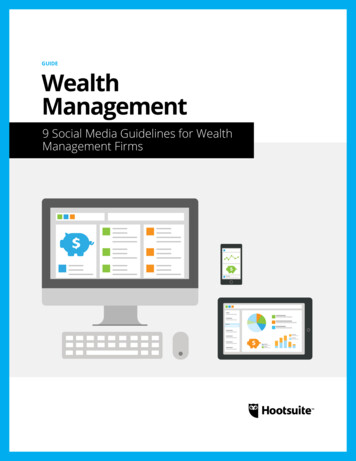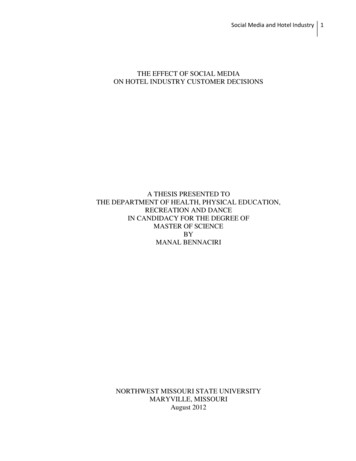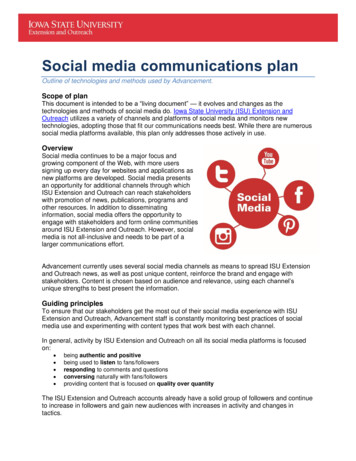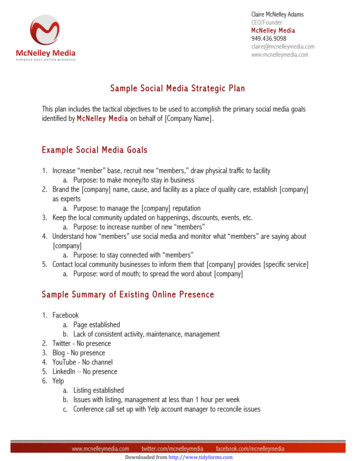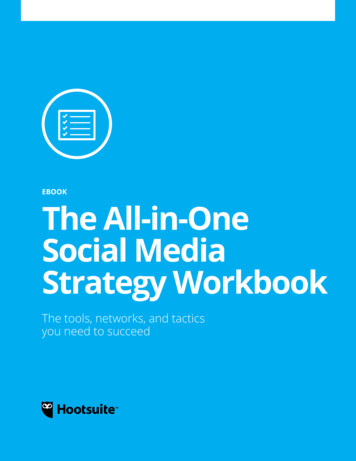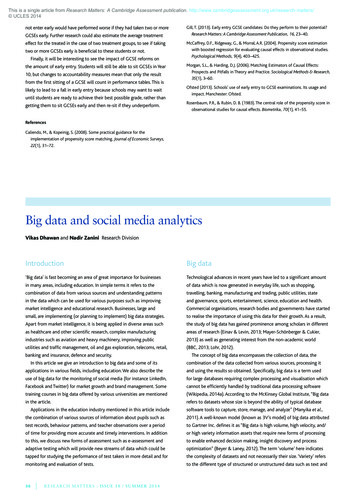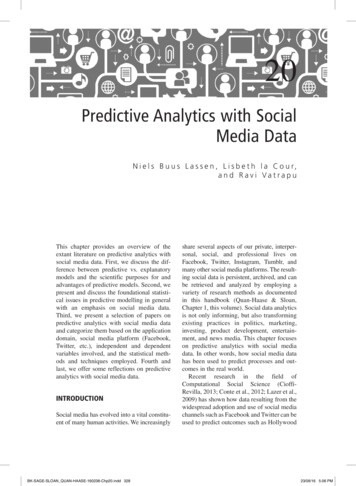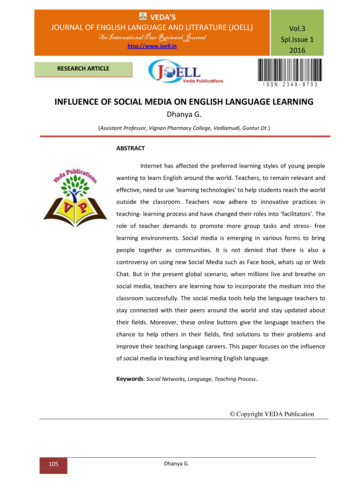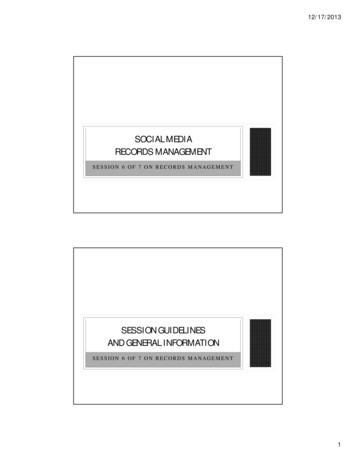
Transcription
12/17/2013SOCIAL MEDIARECORDS MANAGEMENTS E S S ION 6 OF 7 ON RE CORDS M ANAGE M E NTSESSION GUIDELINESAND GENERAL INFORMATIONS E S S ION 6 OF 7 ON RE CORDS M ANAGE M E NT1
12/17/2013GENERAL GUIDANCE FOR ON-LINE SESSIONS1. Please remember that while you are in the on-line classroom, all other participants can heareverything you say (even in the background), and can see everything you write on thewhiteboard.2. I will be muting All participants to help with sound distortion.3. Please make sure that all phones are muted during the sessions. Press *6 and your phone willbe muted.4. Feel free to submit notes during session for discussion. If you would like to send a note /comment, please send to “all” so that everyone can see the question and then hear the answer tothat question.5. Please raise your hand if you wish to speak6. Take a vote: How many of you are participating in today’s session with a group of co-workers?7. If so, how many of you are there in your group? (Send # as a note)8. At the end of the training, I will be taking questions. Write down any questions you haveduring the session, and you will have an opportunity to ask them at the end.PRESENTER (S)Karen GrayRecords Analyst(Records Retention Schedules and Imaging – State Agencies)Archives and Records Management BranchAnd / orJerry Lucente-KirkpatrickRecords Analyst(RM Training; Retention Schedules and Imaging – Local Agencies)Archives and Records Management BranchAnd / orMelanie SturgeonState ArchivistArchives and Records ManagementLibrary, Archives and Public RecordsArizona Secretary of State2
12/17/2013ADDITIONAL CONTRIBUTORS TO THIS TRAININGSteve AdamsSenior Records AnalystNational Archives and Records Administration (NARA)(From presentation to NAGARA - Indianapolis, given onJuly 11, 2013)Patricia C. Franks, PhD, CRMAssociate ProfessorMARA Program CoordinatorSLIS Internship CoordinatorSchool of Library & Information ScienceSan Jose State University(From presentation to NAGARA - Indianapolis, given onJuly 12, 2013)ALL RECORDS MANAGEMENT IN ARIZONA ISGOVERNED BY ARIZONA REVISED STATUTES (ARS) In Arizona, everything that we do in Records Management isgoverned by Arizona Revised Statutes (ARS). The ARS that govern Records Management are:§ 41-151.14 – §41-151.19andPortions of §39-101 – §39-128 The purpose of this training today is to discuss themanagement of electronic records.3
12/17/2013WHAT IS A “RECORD”41-151.18. Definition of recordsIn this article, unless the context otherwise requires: "records" means all books, papers, maps, photographs or otherdocumentary materials, Regardless of physical form or characteristics, including prints or copiesof such items produced or reproduced on film or electronic media pursuantto section 41-151.16, Made or received by any governmental agency in pursuance of law or inconnection with the transaction of public business and preserved orappropriate for preservation by the agency or its legitimate successor As evidence of the organization, functions, policies, decisions,procedures, operations or other activities of the government, orbecause of the informational and historical value of data contained inthe record, and includes records that are made confidential by statute.WHAT IS NOT A RECORD41-151.18. Definition of records - continuedNot included within the definition of records as used in thisarticle: Library or museum material made or acquired solely forreference or exhibition purposes Extra copies of documents preserved only for convenienceof reference Stocks of publications or documents intended for sale ordistribution to interested persons (“State Documents”)4
12/17/2013WHO IS USING SOCIAL MEDIA& WHY PUBLIC BODIES USE ITS E S S ION 6 OF 7 ON RE CORDS M ANAGE M E NTSOCIAL MEDIA d many more5
12/17/2013WHERE DOES YOUR AUDIENCE “HANG OUT” –BASED ON 6Where does your audience “hang out” –based on age?http://pinterest.com/pin/112097478197769776/6
12/17/2013PRIMARY USES OF SOCIAL MEDIA BY GOVERNMENTShareInform citizens of public services through social content (result:increased access to information)ListenObserve, analyze and understand what citizens are sharing (result:improved customer service)EngageRespond, collaborate and create with citizens to improve public services(involve the community directly in government decision making)BENEFITS OF SOCIAL MEDIAFOR PUBLIC BODIES Enable internal collaboration Information sharing with external partnersor contractors Exchange information with the public Keep pace with fast moving events Harness the ideas of the public to supportyour s-of-using-social-media-in-the-federal-government/ Enhance situational l7
12/17/2013BENEFITS OF SOCIAL MEDIAFOR PUBLIC BODIES - CONTINUED Provide greater transparency Reach citizens where they are (online) Provide easier access to services andinformation for citizens Save time word of mouth advertising allowing citizens to answer questions for one another) Save money (otherwise spent on printmaterials and phone calls)WHAT RECORDS MANAGERS NEEDTO KNOW ABOUT SOCIAL MEDIAS E S S ION 6 OF 7 ON RE CORDS M ANAGE M E NT8
12/17/2013OVERVIEW OF WHAT YOU NEED TO KNOW Become familiar with Social MediaUnderstand the value to the organization and subunitsBecome involved from the start (RIM reference should be in everysocial media policy)Set strategic plan to handle social media records both static and dynamic,including the people, objectives, strategies and technologiesBe sure provisions are made for transfer or in place preservationContinue to audit results and evaluate processesUpdate your plan as necessaryScan the horizon for the next new technology that results inrecords that must also be captured and managed—It’s sure to comePatricia C. Franks, PhD, CRM (From presentation to NAGARA - Indianapolis, given on July 12, 2013)TO IMPLEMENT SOCIAL MEDIA RECORDKEEPING Understand the specific risks that apply to social media Know what the organization is doing with social media Develop a social media information strategy Support social media use with a policy that supportsrecordkeeping Be proactive Keep abreast of emerging trends in social media systems anduse Patricia C. Franks, PhD, CRM (From presentation to NAGARA - Indianapolis, given on July 12, 2013)9
12/17/2013RECORDS MANAGEMENT’S ROLEIN SOCIAL MEDIA GOVERNANCE Records management must understand the value anduse of social media to business goals. Records management should determine the value ofcontent and associated risks, including legal andregulatory requirements. Records management should be responsible fordrafting governance polices and procedures includingclassification structure, metadata models, file plans,retention schedules, disposition instructions, and more. Records management should help identify technologyrequirements to support retention requirements.Patricia C. Franks, PhD, CRM (From presentation to NAGARA - Indianapolis, given on July 12, 2013)IF ANSWER IS YES TO ANY OF THE FOLLOWING,YOUR SOCIAL MEDIA MUST BESUPPORTED BY RECORDKEEPING FRAMEWORK Is a high risk or strategic business moving to (using) social media? Are business or client management decisions being made orcommunicated via social media? Are internal processes that were formerly supported by definedprocesses or workflows now moving to social media? Will clients rely on information posted to social channels? Will corporate reporting or accountabilities rely on the informationposted to social media? Will any of the content being used on social media channels bereused? Patricia C. Franks, PhD, CRM (From presentation to NAGARA - Indianapolis, given on July 12, 2013)10
12/17/2013LEGAL CHALLENGES OF SOCIAL MEDIAFOR PUBLIC BODIESS E S S ION 6 OF 7 ON RE CORDS M ANAGE M E NTRISK COMPONENT – TERMS OF USE (TOFU) CONTRACTSProblem – If you want to use the Social Media site you Agree! Employee mindset toward setting up Social Media account is trainedby their own personal use of Social Media We have been trained by previous use to “Click to Agree” to Termsand Conditions – but this is a CONTRACT Contract between Public Body and Social Media site very likelyto be established by employee NOT Lawyer or Procurementprofessional Employee likely did not even scroll through TofU to review foracceptability If they did, they probably would not know what is significant,what is in violation of Public Body procurement policies &practices, etc11
12/17/2013FACEBOOK – CALIFORNIA IS JURISDICTION If you (or your employees) click “Accept” – Your PublicBody Agrees to: You agree to handle any legal challenges in California Santa Clare County California State Laws apply Agree to limit Indemnity Are your Public Body Attorneys licensed in Calif? What You Lose – Your right to handle dispute inArizonaWORKING TOGETHER TO CHANGE FACEBOOKAttorneys General from Colorado, Massachusetts, Michigan, New York,Pennsylvania, Washington state and several others, as well as the NationalAssociation of Attorneys General and National Association of State CIOs(NASCIO)’s Social Media Legal Workgroup participated in the yearlongdiscussions with Facebook.When states began discussing concerns about social media 18 months ago, therewas broad concern among state-level lawyers who worked in procurement,CIO office and other business lines, Robb said.NASCIO Executive Director Doug Robinson added via a statement that terms-ofservice problems “have impeded broader use” of Facebook and other socialmedia tools by states.Colorado took perhaps the most visible stance against Facebook. The StateAttorney General discouraged agencies from launching their own pagesbecause the terms of service were believed to violate the state constitution.From Public CIO, January 05, 2011, by Matt Williams12
12/17/2013SUCCESSES FROM STATE & MUNICIPAL PARTNERSHIP- NEW FACEBOOK TOFU FOR PUBLIC BODIESNew Option for 2011State and Local Government Exception – What YouGet Strikes Jurisdiction / venue in CA Strikes Application of CA Law Strikes the indemnity clause except to the extentindemnity is allowed by a state’s constitution or law Encourage amicable resolution between publicentities and Facebook over any disputesFACEBOOK GOVERNMENT EXCEPTION – HOW TO GET IT State and Local Government Exception AppliesONLY IF: Select “Community / Government” Designation MUST Link Facebook page to your Governmentwebsite Do NOT click “Education” or “Organization” If you opened Facebook page before 2011 – MUSTchange page to “Community / Government”13
12/17/2013ADDITIONAL LEGAL CHALLENGES OF SOCIAL MEDIA Harassment Defamation Copyright/Trademark infringements Breach of Confidentiality Endorsement Advertising Violations RecordkeepingPatricia C. Franks, PhD, CRM (From presentation to NAGARA - Indianapolis, given on July 12, 2013)SOCIAL MEDIA COURT CASES (ONLINE PERSONNA)Eagle v. Morgan, 2013-11-4303 (E.D. Pa. 2013)One of the first trials on the issue of who owns social media accounts:The individual Employee who first created the account?Or the Employer whose business was promoted using the account?The U.S. District Court for the Eastern District of Pennsylvania held that anemployer's conduct, absent a company social media policy, resulted inthe torts of unauthorized use of name, invasion of privacy bymisappropriation and misappropriation of sona/14
12/17/2013“ONLINE PERSONNA” COURT CASES (CONTINUED)The employer may have prevailed if it had implemented a socialmedia policy that covered factors relevant to ownership, such aswhether:(1) the employer paid the social media account fees;(2) the employer dictated the precise contents of the employee'saccount;(3) the employee acted expressly on behalf of the employer due toher position, role or responsibility; or(4) the social media account was developed and built throughinvestment of the employer's time and ona/CHALLENGES OF SOCIAL MEDIA –RECORDS MANAGEMENTS E S S ION 6 OF 7 ON RE CORDS M ANAGE M E NT15
12/17/2013THE “PLACE” OF PUBLIC RECORDSWhy Mix Social Media andRecords Management?Isn’t Inherent Transparency of Social MediaEnough?Are Openness and Transparency the onlyresponsibilities of Government?DUTIES OF ALL PUBLIC BODIES AND EMPLOYEESFOR RETENTION & PRESERVATIONEstablish and maintain an active,continuing program for the economicaland efficient management of the publicrecords of the agency.ARS 41-151.14(A)(1)16
12/17/2013IS I.T. IN THE RM BUSINESS?Questions to think about as we move through the rest of thispresentation: What is the difference between data and records? Is it I.T.’s “responsibility” to provide Records Management service to theircustomers? Who is in the best position to “manage” electronic records? Is it I.T.? Is I.T. the creator of the content / record? Or, is I.T. the “post-er” of the content / record? Do any of these questions matter?WHEN IS SOCIAL MEDIA NOT SO SOCIAL?Challenges with Social Media Records: A.R.S. require we (government) control (manage) our recordsduring their entire retention period. Social Media sites provide little to no tools to help manageYOUR records on THEIR sites. Who controls the content on Social Media sites? Challenges to compliance with RM Statutes.17
12/17/2013I’VE GOT THE KEYS TO THE CAR, BUT NO BRAKES!In Summary, “Everyone Is Doing It!” (Social Media) “No One Can Do It!” (RM for Social Media) You May or May Not Own It (Your Information) You Must Manage It (Your information) Where’s Facebook when you need help? (to meet Statutoryrequirements) “Why did you want to live here?”SOCIAL MEDIA VIRGINS BEWARE!1. If You Post it, You Own It Whatever content / records government bodies post to Social Media sitesbelongs to the public body and NOT to the Social Media site - from aRecords Management point-of-view.2. If You Own It, You Manage It If you post something to any Social Media site, and the posting (words,pics, video, etc.) is work-related, then you have a statutory responsibilityto retain the posted information for the approved & correct retentionperiod. Link to Social Media Records Retention Schedule: %20-%20email.pdf3. If You Created It, You Own It The Creator of any content being posted to social media sites (or otherwebsites) needs to be responsible for the proper retention of the contentthey created.18
12/17/2013YOU’VE GOT THE POWER- AT LEAST SOME4. Unique vs. Copy Copies Are Not Records. As such, copies do not need to be managed. Avoid posting any unique or original content to social media sites. Post only copiesof information being managed elsewhere by a specific person responsible for itsretention. This is especially grievous with Videos posted to YouTube, and the like.5. “Blogs and Wall Posts, Oh My!” These are the two most likely areas for Unique content that will need to be managed.6. Email All Wall Posts Make sure you set up your social media site to generate an email to your designatedemail account (ex. records@azlibrary.gov) whenever anyone posts a comment to yourwall. You can then manage that email for retention since you cannot manage theretention on your social media site.7. Email All Posted Content When you post information to your social media website, copy the designated emailaccount (ex. records@azlibrary.gov) on that email. This gives you some way of trackingwhat was on your Social Media site at what time.RM QUESTIONS FOR SOCIAL MEDIA MANAGEMENTImportant RM Concept for all forms of ElectronicCommunication: Is Content in Communication a Copy? Is that content (of original not copy) being retainedand managed (from RM perspective) elsewhere? Is Content Unique information? Is Unique Content being retained and managed(from RM perspective)?19
12/17/2013KEY ASPECTS TO YOUR SOCIAL MEDIA POLICY Identifying what constitutes a record on social media platforms Defining ownership of content and responsibility for managing therecords Developing recordkeeping requirements Incorporating recordkeeping practices and requirements into Terms of Use Communicating records policies so employees and the public understandhow records will be managed Monitoring the ongoing use of social media platforms to determine if thatuse changes the value of the records Monitoring any changes to third-party terms of useSteve Adams (From presentation to NAGARA - Indianapolis, given on July 11, 2013)FOUR (4) SPECIFIC PROBLEM AREASS E S S ION 6 OF 7 ON RE CORDS M ANAGE M E NT20
12/17/20131. BEWARE “EXECUTIVE COMMUNICATION”AND SOCIAL MEDIA***Beware “Executive Correspondence” in Social Media*** Executive Correspondence is a Permanent record if it “sets or discusses policy”. Permanent Records - must be retained on paper or microfilm.***How will this be possible on Social Media? Any communication / correspondence that either discusses or sets policy, and takesplace in any “physical form or characteristic” (ARS §41-1350), involving an executive(any Board, Commission or Council member, an Agency Director, elected official, County/ Department / Division Leadership) will meet the definition of “ExecutiveCorrespondence”. Where this discussion takes place does not matter: could be on paper, on a website, in anemail, on Social Media, in a blog, in a shared workspace, definitely in Sire, etc. Since Policies are Permanent, then executive discussions of Policies become importantPermanent records to help provide context to the Policy(ies). This specific records series is from the Management Records General Retention Schedules2. DEFINITION OF HISTORICAL RECORD - OFINTEREST TO STATE ARCHIVESIf a record is historically significant, it is a permanent record.**Permanent Records are of interest to the State Archives and future researchers.The following are deemed historically significant records when: Document a controversial issue Document a program, project, event or issue that results in a significantchange that affects the local community, city, county or state Document a program, project, event or issue that involves prominentpeople, places or events Document a program, project, event or issue that resulted in mediaattention locally, statewide or nationallyGeneral Retention SchedulesAny record series listed as permanent on a general retention schedule shouldbe transferred to the State Archives when the agency or political subdivisionno longer wishes to maintain those records. You can reach the State Archivesat 602-926-3720 or 800-228-4710 to discuss the transfer of the records.21
12/17/20133. VIDEO AS RECORD / PERMANENT RECORDVideos and Tweets: Your website, YouTube, FaceBook, Twitter, etc Make sure your only copy of the video / tweet is NOT online @ Social Media site.What types of videos / tweets would be of interest: Involving Core Values / Duties of Office Deal with controversial topics and/or topics of interest – You will recognize many of theseissues, especially if you suddenly get a large number of letters, calls or e-mails on a hot topic:in opposition to an issuein support of an issueexpressing a concern Examples of Current / Recent IssuesAbortion, Alternative fuels, Environmental issues, Fiscal concerns, Forests, wildfires andforest management, Gambling / casinos, Gas prices, Gay rights, Gun control, Freeways orhighways, Illegal immigration, Land and development issues, Legalization of drugs,Legislation (involving your Agency), Important landmarks (if you still have correspondence),Terrorism/terrorists, Water issues, Welfare issues (for or against)4. ELECTED OFFICIALS AND
The U.S. District Court for the Eastern District of Pennsylvania held that an employer's conduct, absent a company social media policy, resulted in the torts of unauthorized use of name, invasion of priva

